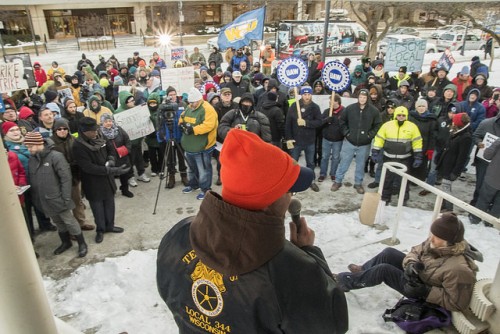Since the death of Supreme Court Justice Antonin Scalia, many media organizations are following the tussle between President Obama and Congress about naming a successor to the court. Scalia’s death also impacts a number of cases under review of the country’s highest court including Friedrichs v. California Teachers Association. The decision affects the labor movement and how some unions can be financed.
If you’re looking to report on how the court case could affect unions, unionized businesses and workers, here are some ideas and info to get you started.
Friedrichs v. California Teachers Union
An agency shop is a workplace where workers must pay a fee to the union (similar to member dues) whether or not they are union members. In January, the U.S. Supreme Court heard oral arguments in Friedrichs v. California Teachers Association. The lawsuit could prevent public-sector unions from collecting agency fees. Such a decision could reverse Abood v. Detroit Board of Education, which gave unions the right to assess those fees. These fees are only used for union services like negotiating a contract or filing a grievance. The Abood ruling required workers to opt in to any additional contributions to unions’ political agendas.
In Friedrichs, plaintiffs argue that agency fees violate their free speech rights. Plaintiffs say the work of unions is “inherently political,” and the union doesn’t represent the views of all workers paying agency fees. Abood v. Detroit Board of Education ruled that the agency fees for bargaining were separate from the political advocacy of unions.
Many expected Justice Scalia to be the swing vote in the case. A 4:4 split decision by the Supreme Court would default to the appellate court ruling. The Ninth Circuit Court of Appeals applied Abood to the case in its decision and ruled against the plaintiffs.
“Right-to-work” legislation
A number of state lawmakers are debating “right-to-work” laws. Indiana, Michigan, Wisconsin and West Virginia are the latest states to enact laws that make it illegal to require union membership as part of employment. In right-to-work states, workers do not need to pay dues to receive the benefits of union-negotiated contracts.
The law has a long history in many southern and some western states. In 2011, Indiana became the first state in more than a decade to pass the law. A number of lawmakers in “rustbelt” states vying to attract companies say the legislation makes them more appealing to business investment. A few other state legislators are debating how such legislation might impact businesses in their own states.
Proponents say that without the law, workers must join the unions that negotiate on their behalf. Labor advocates say the legislation attempts to weaken unions by depriving them of the needed capital to support workers and bargain.
Wage data in union and nonunion companies by industry
The Bureau of Labor Statistics collects and analyzes troves of data related to union membership and the benefits and costs associated with it. BLS statistics reveal (on average) that union workers do earn more than nonunion workers. A 2012 BLS report on the difference between union and nonunion jobs also linked higher wages to greater access to more employer-sponsored benefits.
The BLS releases an annual report of union members. In it, you can see union density and median earnings data broken down by employee demographics, industry and state.
Right-to-work and manufacturing jobs
And while proponents can find anecdotal evidence of job growth in right-to-work states, the laws don’t address lower payroll costs outside the U.S.
A February report by the Chicago Tribune documented the decision and economic impact of Oreo-producer Mondelez International to move its union confectionery plant from Chicago’s southwest side to Salinas, Mexico. States and companies like Mondelez weigh the costs and benefits of stateside manufacturing jobs and union density is often on the radar, according to right-to-work proponents.











